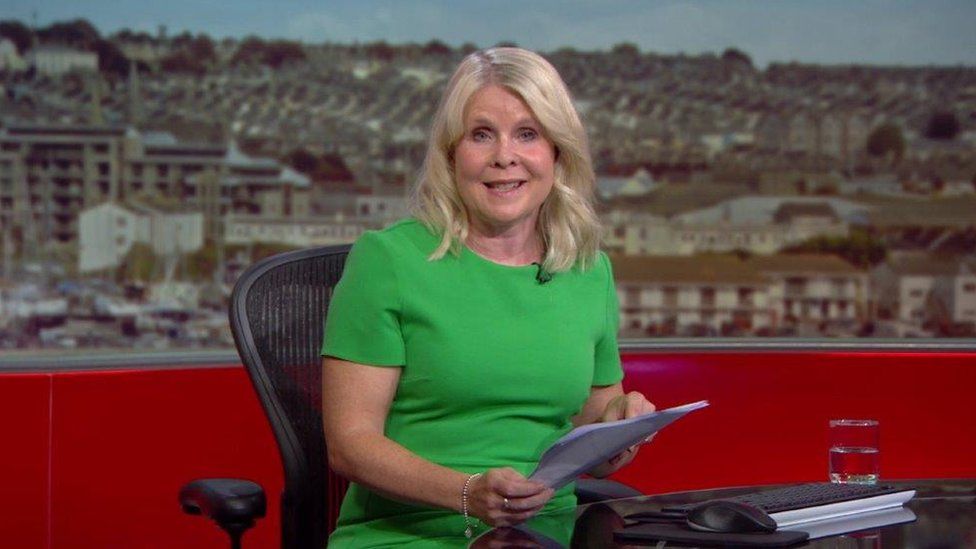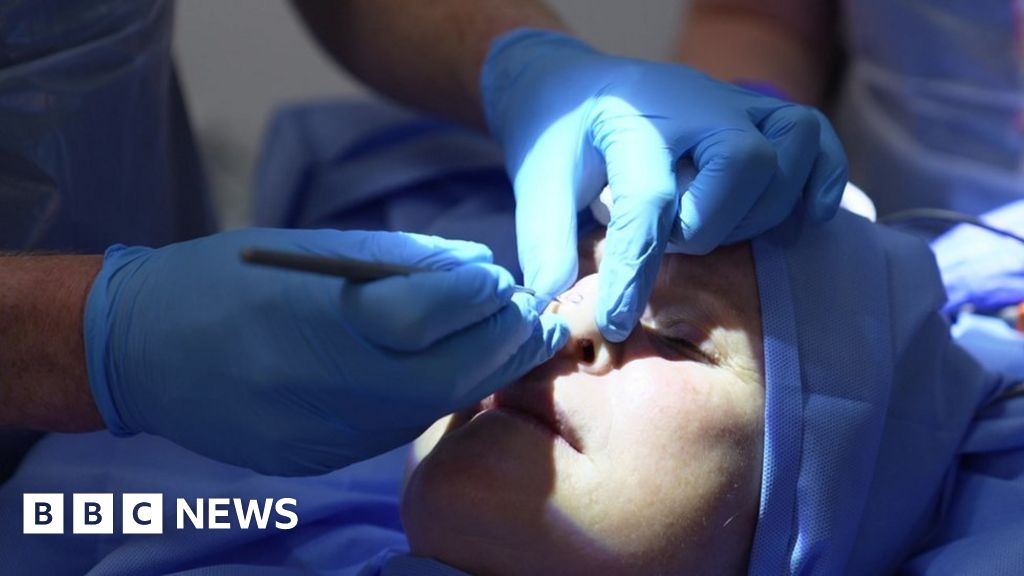
Anna Varle said applying make up to cover her scars was painful at first
About 150,000 cases of non-melanoma skin cancer are diagnosed each year – two-and-a-half times the number seen in the early 1990s, according to Cancer Research UK. When BBC journalist Anna Varle found out her skin cancer had returned, she wanted to raise awareness by sharing her story.
“You have another one,” the surgeon says.
This would be the third basal cell carcinoma (BCC) I have had removed from my face in a matter of months. Two on my nose and one on my forehead.
The MOHS surgery took place at Derriford Hospital in Plymouth
Basal cell carcinoma is the most common type of skin cancer and, according to the NHS, treatment for non-melanoma skin cancers are successful in 90% of cases.
I feel incredibly thankful it’s not a melanoma and BCCs rarely spread to other parts of the body.
But unfortunately these aren’t the first ones I’ve had.
Eighteen years ago I went under the knife at Northampton General to have one removed from my nose.
I remember the surgeon at the time telling me in stern words I was the youngest person he had had on his table.
I’d spent my childhood in the sun as I grew up overseas in countries such as Somalia, Sri Lanka and Papua New Guinea and sun protection wasn’t the thing it is today.
What I didn’t know in 2005 was that once you have had one BCC, the chances are more will follow.
Causes of non-melanoma skin cancer
Overexposure to ultraviolet light – from the sun, as well as from artificial tanning sunbeds and sunlamps – is the main cause of non-melanoma skin cancer.
Other risk factors that can increase your chances of developing non-melanoma skin cancer include:
- Previous non-melanoma skin cancer
- Family history of skin cancer
- Pale skin that burns easily
- Large number of moles or freckles
- Taking medicine that suppresses your immune system
- Co-existing medical condition that suppresses your immune system
Basal cell carcinoma is the most common type of skin cancer
One of the latest ones had appeared as a small scab on my nose which kept reappearing.
I sent a photo to my GP who referred me to Dermatology at Derriford Hospital.
But when I went in for my appointment, the scab had disappeared.
I apologised for wasting the surgeon’s time but a biopsy in December confirmed my fears and five months later I was back on a hospital bed having it removed.
The operation is done under local anaesthetic to remove the cancer.
It is then taken to a laboratory next door where they check they have got it all. When that is confirmed a skin graft and plastic surgery takes place.
After the surgery Dr Toby Nelson checked the whole tumour had been removed
The whole process is done in a day.
The surgery, called MOHS, is considered the most effective way of treating BCCs and squamous cell carcinomas.
During the first operation, Dr Toby Nelson took skin from near my ear to graft on to my nose where the cancer had been.
But I was much more worried about my second operation in July.
Just weeks before the first surgery another small scab had appeared on the tip of my nose.
‘Dreading the pain’
My surgeon confirmed it and a few months later I was back in to have it removed.
This was when he spotted another on my forehead.
I had been dreading going through the operation again.
Dreading the pain. Worried about the scars. Anxious about how it could affect my career and how long it would take to heal.
But the treatment I received from the team was gold standard.
Image source, Anna Varle
After the surgery I felt anxious about how I looked and about going outside
Dr Nelson removed the lesion on my forehead and then moved skin around on my nose in an incredibly clever way to cover the hole the cancer had left there.
Each operation has required several weeks of recovery at home.
Afterwards I felt anxious about how I looked and even more anxious about going outside.
When I did go out I noticed people staring at me and strangers asked what had happened to my face as the scars were red and still healing.
I am now back on television and cover my scars in make-up when I’m presenting.
At first it was painful to apply and I asked for the camera to be kept at a distance as I was self-conscious.
‘Terrifying experience’
A couple of months on I feel comfortable being in front of the camera and no longer ask for a wide shot.
As to how my life has changed – I wear SPF all year round and a hat when I’m outside. I also ensure my children are covered top to toe in suntan lotion.
For now I’m clear, but I’ve been told I’ve got a 30% chance of having more BCCs in the next three years.
Dr Nelson told me in Plymouth alone they diagnose up to 10 people a week with a new melanoma.
Cancer Research UK said Melanoma skin cancer incidence rates were significantly higher in the South West than the England average.
It has been a painful and terrifying experience for me, so if I can encourage just one person to wear sunscreen, a hat and to get anything checked that doesn’t look right, I’ll be happy.”
Follow BBC News South West on Twitter, Facebook and Instagram. Send your story ideas to spotlight@bbc.co.uk



